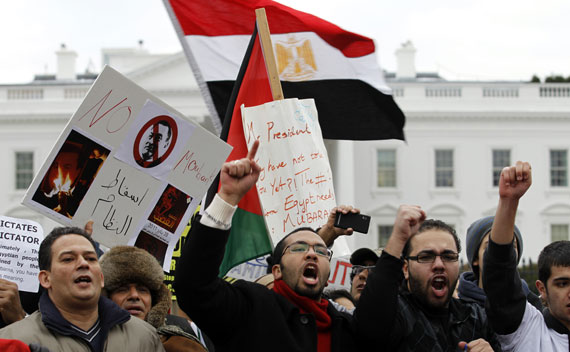Guest Post: What the American Public Thinks about Egypt

Politicians, pundits, and bloggers have all been weighing in with their assessments of how President Obama handled the protests in Egypt and what Hosni Mubarak’s ouster means for U.S. interests in the Middle East. But what do average Americans think about what has happened? I asked my colleague Charles Landow, Associate Director of CFR’s Program on Civil Society, Markets and Democracy, to take a look at what the polls have to say. Here’s what he found:
President Barack Obama has devoted less rhetoric and attention to promoting democracy in the Middle East than did his predecessor, President George W. Bush. And Obama’s cautious reaction to the pro-democracy protests in Egypt drew some criticism. Among the critics were former Bush administration officials, such as CFR’s Elliott Abrams and Mark Lagon, who urged Obama to reprise Bush’s “freedom agenda” and embrace Egypt’s protesters more enthusiastically.
But how did Obama’s stance toward Egypt play among average Americans? Polls taken over the course of the uprising by Rasmussen Reports, the Pew Research Center for the People and the Press, Gallup, and Fox News show reasonable though hardly overwhelming support for Obama’s response. And as we might expect, Republican respondents were more critical of the president than Democrats. For example, in the Pew poll, 69 percent of Democrats approved of Obama’s stance while only 43 percent of Republicans agreed.
But the surveys also reveal something surprising: Americans are unsure that the democratic upheaval in Egypt will benefit the United States. In polls taken during the protests, before former president Hosni Mubarak stepped down, respondents’ views ranged from somewhat sanguine (60 percent in the Gallup survey said Egypt’s political changes would be “mostly good” for the United States) to fairly alarmed (67 percent in the Fox News survey said events in Egypt were “worrisome”). Even after Mubarak had resigned, only 29 percent of respondents in another Rasmussen poll thought the transition was a good thing for the United States.
Also interesting is the partisan divide in these findings: Democrats viewed the changes in Egypt more positively than did Republicans. The Gallup poll showed a 20-point gap among those who said Egypt’s upheaval would be mostly good for the United States (71 percent of Democrats versus 51 percent of Republicans). In the Fox News poll, more than twice as many Democrats as Republicans called Egypt’s revolution inspiring, and 81 percent of Republicans called it worrisome. (Not all numbers from that poll were released.)
Indeed, the freedom agenda views advanced by some conservative commentators do not seem prevalent among Republicans in general. According to the Pew poll, more Republicans (19 percent) thought Obama had shown too much support for Egypt’s protesters than believed he had shown too little (15 percent). We cannot say from the available data why so few Republicans favored stronger support for the protesters. Some may be “realists” who fear that Egypt’s upheaval will bring Islamists to power and adversely affect Israel. Others may believe the United States should be less involved in foreign affairs overall.
But more generally, the poll numbers highlight the political difficulty of democracy promotion as a central plank of foreign policy. It seems a no-brainer: what American would side with an aging strongman over the inspiring Egyptians in the streets? And it’s true that most Americans did view the protesters sympathetically. But according to the numbers, they are less sure that the strongman’s ouster will turn out well for the United States.
(Note about the polls cited in this post: the Rasmussen surveys polled “likely U.S. voters,” the Fox News survey polled “registered voters,” and the Pew and Gallup surveys polled simply American adults.)
 Online Store
Online Store